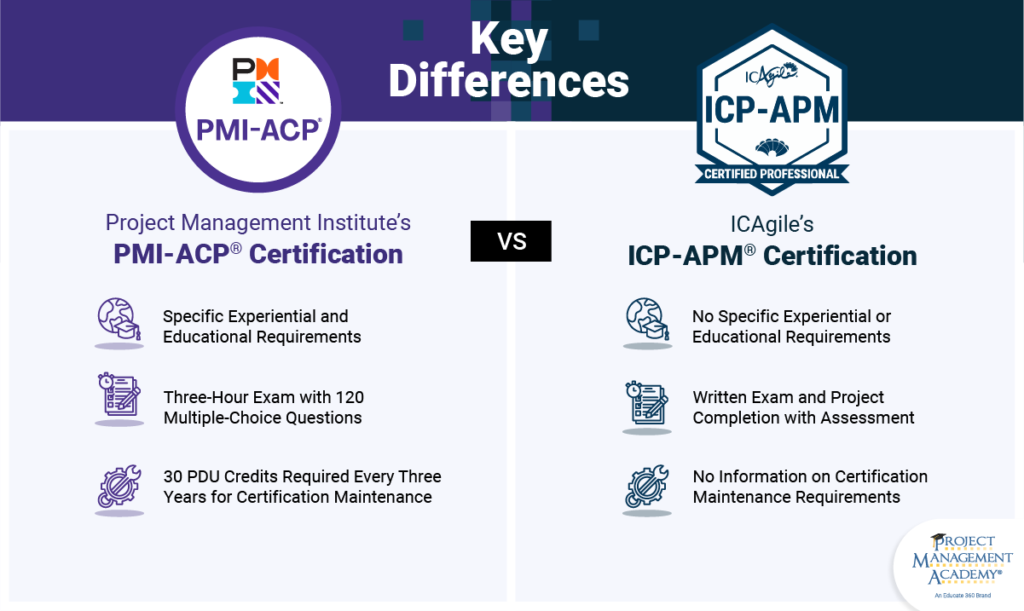In today’s rapidly changing business landscape, organizations are on a constant lookout for professionals adept in Agile methodologies to steer projects towards success. Consequently, Agile certifications have become a valuable credential, signifying proficiency in Agile principles and practices. Two such prominent certifications are the ICP-APM (ICAgile Certified Professional in Agile Project Management) and the PMI-ACP (Project Management Institute – Agile Certified Practitioner). But which one is right for you?
On this page:
- What Is ICP-APM?
- What Does The ICP-APM Certification Cover?
- What Is PMI-ACP?
- What Are the Differences Between the PMI-ACP and ICP-APM Certifications?
- Which Certification Should Earn the Top Spot on Your List?
What Is ICP-APM?
ICP-APM stands for ICAgile Certified Professional in Agile Project Management, and it’s a certification designed for project managers. The “IC” is the first two words of the International Consortium for Agile, an organization that dedicates itself to helping programmers hone their project management skill set using Agile techniques.
What Does The ICP-APM Certification Cover?
This certification covers a broad array of tools and techniques that help you become a better project manager. However, the concepts the ICP-APM certification espouses are relatively high-level. In other words, they apply to a variety of project management settings, not just software development.
As a result, this certification is essentially discipline-agnostic. So regardless of how you want to apply Agile principles, the ICP-APM certificate will likely put you in a position to excel. Here are some topics you can expect to cover when going through the ICP-APM certification process.
Agile Coaching Techniques
Coaching lies at the heart of Agile methods. Your guidance and leadership as a project manager are invaluable in keeping the boat sailing in the right direction. The certification deals with how to teach Agile techniques and also ensures you can provide helpful feedback and guide your teams. In addition, it covers how to implement changes within your organization so that your team members are contributing to the organization’s goals.
General Agile Principles
Agile principles begin with the Agile manifesto which is covered by the ICP-APM as well as how to implement them in practice. Rather than merely skimming through the manifesto’s highlights, the certification is designed to ensure you know how to apply its approach in real-life scenarios.
Agile Project Planning
The Agile project planning material focuses on aligning the needs of stakeholders with the phases of your project. ICP-APM certification covers how to craft user stories that power the rest of your processes. Plus, since “cash rules everything around [us],” the Agile project planning material also touches on how to budget for an Agile project.
Leadership
Leadership, from the perspective of Agile project management, is different because the workflows and interactions between team members require unique adaptability. The ICP-APM certification covers the skills needed to be an effective Agile leader. This includes managing and encouraging stakeholders and espousing a culture of ongoing improvement.

Ultimate Guide to PMP® Certification
Navigate the process of becoming a PMP® certified professional.
What Is PMI-ACP?
PMI-ACP is an acronym for Project Management Institute Agile Certified Practitioner. The PMI-ACP certification has been engineered to give evidence of your experience and knowledge when it comes to Agile practices.
A primary focus of the PMI-ACP certification program is the different Agile techniques. You’ve likely heard of some—or all—of them: Scrum, Lean, Kanban, and XP are some of the most common. The PMI-ACP has a specific target learning group: people who already have experience with Agile project management and at least a secondary education. Also, it’s important to note that, to qualify, your experience must be recent—within the last three years.
More specifically, you need at least 21 contact hours where you’ve been trained according to Agile practices. You must also have had at least 12 months of experience working on projects within the last five years.
Additionally, your project experience must include at least eight months of Agile-specific experience within the past three years.
The PMI-ACP is also designed to be a steppingstone to other credentials offered by Project Management Institute. For instance, you can use the knowledge you gain from the PMI-ACP certification—along with a few more years of experience—to qualify for a Project Management Professional (PMP), PMI Professional in Business Analysis (PMI-PBA), or a Disciplined Agile Value Stream Consultant (DAVSC) certification—all of which are offered by PMI.
What Are the Differences Between the PMI-ACP and ICP-APM Certifications?
On the surface, the most significant differences between these two certifications are the eligibility requirements discussed above. The PMI-ACP certificate has specific experiential and educational requirements, while the ICP-APM does not. Even so, there are other differences worth considering.
Methods of Assessing Candidates
The PMI-ACP assessment methodology is relatively straightforward. Candidates take a multiple-choice exam that lasts three hours. If they pass the test and have met the other prerequisites, they receive the certification.
The ICP-APM, on the other hand, requires more than just sitting for a test. In addition to a written exam, candidates must complete a project, the quality of which also gets assessed. In addition, to get your ICP-APM certification, you must demonstrate real-world experience.
What You Have to Do to Maintain Your Certification
The requirements for maintaining your certification are different for the two programs.
To maintain your PMI-ACP credentials, you must earn at least 30 PD (professional development) credits every three years. This is similar to what some teachers or members of professional organizations have to do to uphold their qualifications. The ICP-APM certification is different in that there’s no information on its site regarding steps you need to take to maintain your certification. This may mean that once you’ve earned your ICP-APM certification, you’re credentialed for life.

Which Certification Should Earn the Top Spot on Your List?
Even though the certification you choose to get will vary based on professional goals and circumstances, here are some general guidelines that may help you rank these programs.
For Those Just Starting Out: ICP-APM
ICP-APM certification doesn’t have any prerequisites, which makes it an ideal starting point for people new to Agile project management. You can simply begin the certification program and earn your credentials.
For Experienced Agile Project Managers: PMI-ACP
PMI-ACP may be a better fit for professionals with at least a few years on the job as Agile project managers. Because the certification program focuses on specific Agile techniques, it can be a good learning experience for those who want to diversify their methodology portfolio.
For example, suppose you’re comfortable with Lean and Scrum principles because you’ve been using them for a couple of years, but you’d like to dive deeper into Kanban. The program’s Kanban-specific material may be just what you need to expand your skill set.
For Very Busy Professionals: PMI-ACP
The PMI-ACP certification may be better for extremely busy professionals because it only requires you to take a test to attain it. You don’t have to do anything else that may be time-sensitive, such as attend a live class.
The ICP-APM is different in that it requires candidates to go to a live class. Even though this kind of hands-on learning is ideal for information retention and skill development, it may be a lot to add to a busy person’s schedule.
Start Working On Your Agile Certification Now
While both the PMI-ACP and ICP-APM certifications cover Agile principles and practices, the best one for you will depend on your situation. Regardless of where you are in your professional journey, you’ll need resources to position yourself to achieve the certification you choose. This is where Project Management Academy can make a big difference. Using our courses, you can acquire the skills you need to excel within any Agile project management program. Start learning today by connecting with Project Management Academy now.


 New Horizons
New Horizons
 Project Management Academy
Project Management Academy
 Six Sigma Online
Six Sigma Online
 TCM Security
TCM Security
 TRACOM
TRACOM
 Velopi
Velopi
 Watermark Learning
Watermark Learning
 Login
Login




 New Horizons
New Horizons
 Project Management Academy
Project Management Academy
 Velopi
Velopi
 Six Sigma Online
Six Sigma Online
 TCM Security
TCM Security
 TRACOM
TRACOM
 Watermark Learning
Watermark Learning